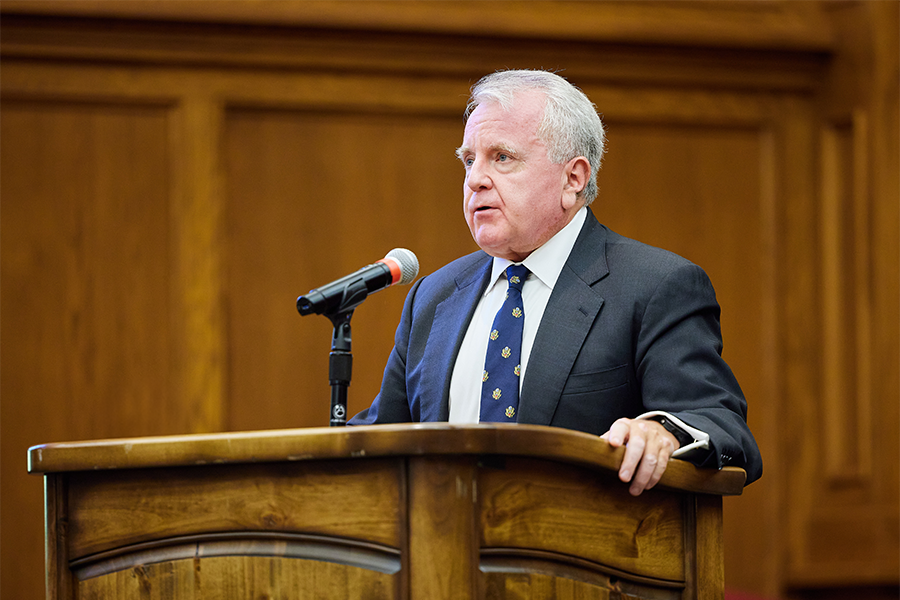
NORMAN, OKLA. – John J. Sullivan, former U.S. Ambassador to Russia, recently visited the University of Oklahoma to discuss his newly published book, Midnight in Moscow, a Memoir from the Front Lines of Russia’s War Against the West. The event, hosted by the OU College of Law and the David L. Boren College of International Studies on Sept. 26, provided insights into Sullivan’s diplomatic career and the deteriorating U.S.-Russia relations.
Sullivan, who served as U.S. Ambassador to Russia from 2020 to 2022, spoke with over 100 OU students on Sept. 26 in the Dick Bell Courtroom at OU. He shared his journey from being a lawyer to a key figure in U.S. foreign policy.
“I went to Russia as an amateur ‘Russophile” – someone who was interested in Russia, the Russian people, Russian culture and Russian history. I did not speak the language. My career was as a lawyer,” said Sullivan, a 1985 graduate of Columbia Law School.
Before his ambassadorship, he served as the U.S. Deputy Secretary of State. Initially considering leaving government service, Sullivan was drawn to the challenge of serving as ambassador to Russia.
“Russia was the most difficult counterintelligence environment for any U.S. embassy due to the constant surveillance and harassment by Russian security services,” he said.
Sullivan had arrived in Moscow hoping to improve relations between the two nations. He quickly discovered that the Russian government, led by President Vladimir Putin, already considered itself at war with the United States. In one of his first meetings with the Russians, he noticed the stark contrast in diplomatic language between the two countries. While the U.S. State Department referred to Russia as a “competitor” or “adversary,” Putin openly called the United States “the enemy.”
In his talk, Sullivan also touched upon the June 2021 meeting between Presidents Biden and Putin, which he said lacked discussion about Ukraine. However, within months, Ukraine had become what Putin described as an “existential crisis” for Russia, Sullivan said. Sullivan revealed that starting in November 2021, the U.S. government engaged in intense diplomacy to prevent a Russian invasion of Ukraine. Sullivan characterized these efforts as “sham diplomacy” on Russia’s part, as Putin was not interested in a negotiated solution.
Jonathan Stalling, Ph.D., interim dean of the David L. Boren College of International Studies, said the lecture was riveting, particularly the conversation led by Hannah Chapman, Ph.D., the Theodore Romanoff Assistant Professor of Russian Studies in the College of International Studies.
“Former Ambassador Sullivan shared firsthand experiences in Russia during one of the most critical periods in modern U.S.-Russia relations. He addressed the diplomatic breakdowns that preceded Russia’s invasion of Ukraine and the severe consequences of Putin’s autocratic ambitions then and still unfolding in the present. While Ambassador Sullivan painted a harrowing picture of what a world without continued U.S. resolve in confronting Russian expansionism might look like, he also inspired our students to consider serving in foreign service and diplomacy as one of the most rewarding and enriching careers possible,” Stalling said.
In his role as ambassador, Sullivan regularly communicated with U.S. businesses operating in Russia as part of the American Chamber of Commerce in Russia, known as AmCham. Beginning in January 2022, he warned the companies about the impending war in Ukraine. He faced some skepticism from experienced business leaders who believed Putin was bluffing. Sullivan would point out specific military preparations that indicated Russia’s serious intent to invade, including unprecedented troop movements and logistical arrangements near the Ukrainian border.
Despite diplomatic efforts, Russia invaded Ukraine in February 2022. Sullivan acknowledged that while U.S. diplomacy failed to prevent the invasion, they underestimated the Ukrainians’ ability to resist. The ambassador described the war as “brutal” emphasizing the horrific consequences of Putin’s actions against an independent country. During the talk, he also highlighted the Russian military’s incompetence and lack of preparation, citing examples such as soldiers suffering from frostbite due to inadequate gear.
“We are fortunate to have Ambassador Sullivan share his unique perspective on U.S.-Russia relations during such a critical time. His practical knowledge enhances our students’ understanding of global affairs beyond the classroom,” said Anna E. Carpenter, J.D., dean of the OU College of Law.
Learn more about the OU College of Law.
Learn more about the OU David L. Boren College of International Studies.
About the Book
Midnight in Moscow: A Memoir from the Front Lines of Russia’s War Against the West explores former U.S. Ambassador to Russia John J. Sullivan’s experiences during critical moments of the geopolitical tension between Russia and the West. Published in August 2024, the book offers a firsthand account of the challenges faced by those on the frontlines.
About the University of Oklahoma
Founded in 1890, the University of Oklahoma is a public research university located in Norman, Oklahoma. As the state’s flagship university, OU serves the educational, cultural, economic and health care needs of the state, region and nation. For more information about the university, visit www.ou.edu.
To combat power outages and extreme weather events, a team led by University of Oklahoma researchers has helped launch a project utilizing electric school buses as a backup energy resource.
The University of Oklahoma Health Campus was recently recognized for its increased momentum in advancing discoveries that change lives, achieving the state’s first Top 100 national ranking based on funding from the National Institutes of Health, according to the Blue Ridge Institute for Medical Research. The ranking—the highest in OU’s history and in the state—solidifies the University’s position as the state’s leading driver of health-related research.
Stefano Tarantini, an assistant professor in the Department of Neurosurgery at the University of Oklahoma College of Medicine, spends his days in the laboratory searching for answers to the cognitive decline that too often plagues older adults.